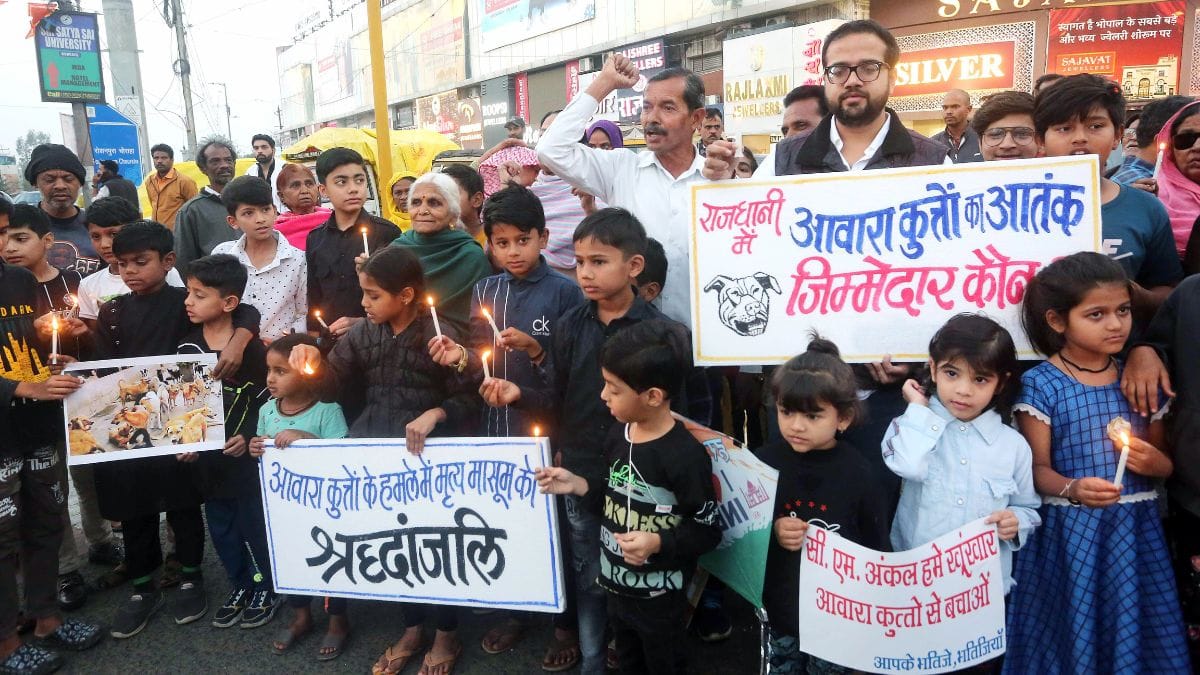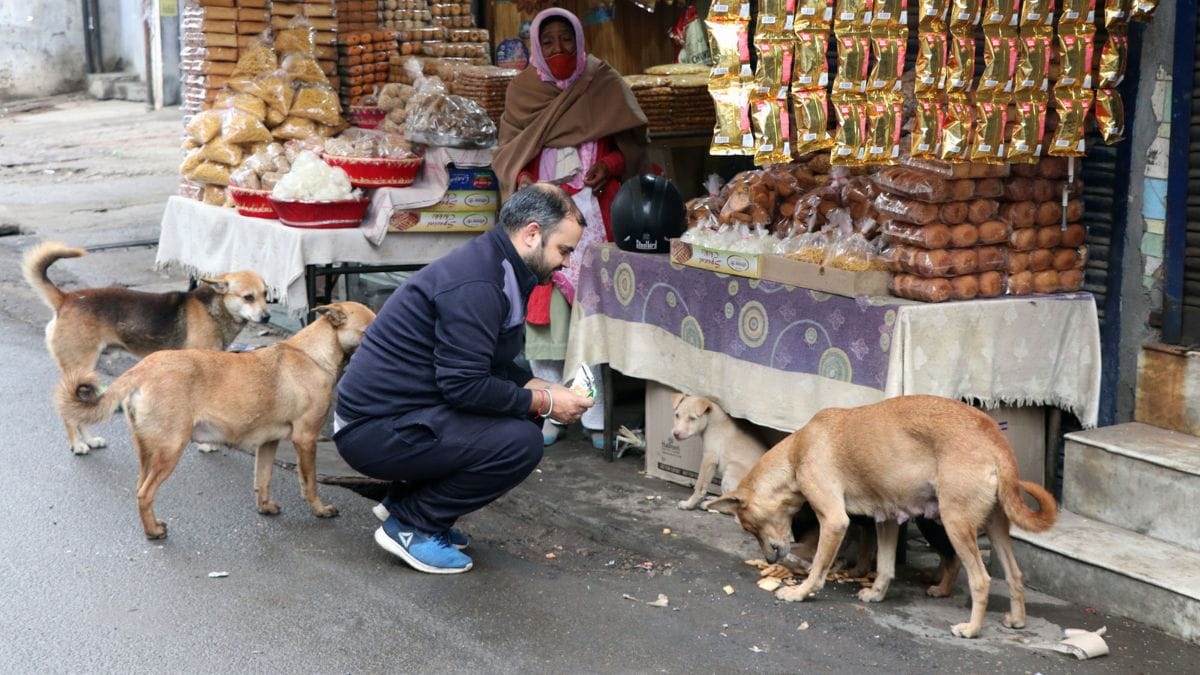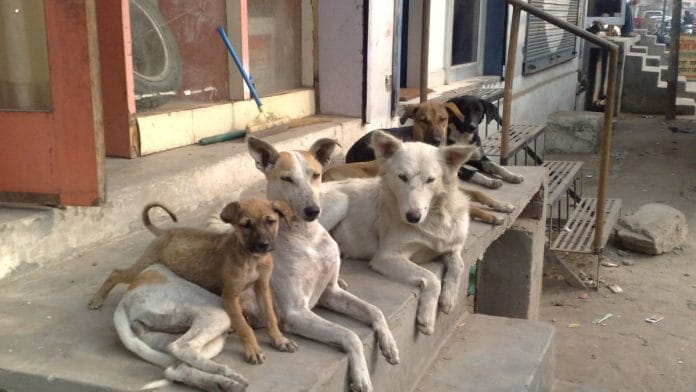New Delhi: Delhi Chief Minister Rekha Gupta’s directive calling for the relocation of stray dogs as part of a large-scale cleanliness drive in the national capital has drawn the anger of the animal lover and rescuer community.
They say relocation amounts to cruelty and goes against the law and established rules that have been upheld by various courts. The rehabilitation proposal is flawed and an overreach, they add, as stray dogs have adapted to living on the streets over several years and attempts to move them would cause an even bigger problem, considering their sheer population.
Overall, animal rescuers believe this is a knee-jerk reaction to complaints against stray dogs, as the sterilisation efforts undertaken by the government to control their numbers have fallen woefully short.
Resident Welfare Associations (RWAs) on the other hand, have lauded the CM’s move saying this will help bring down incidents of stray dog bites and make the streets safer for children and senior citizens.
Citizen groups have argued in courts that stray dog bites create a menace in society and in the name of compassion for these animals, the lives of human beings cannot be sacrificed.
While several Supreme Court and high court orders have upheld the ABC Rules—which make a case against relocation—in human-stray dog conflict cases, some high courts have also issued directions calling for relocation or removal in past orders. However, most past orders have emphasised the importance of a balanced approach to this problem.
ThePrint looks at existing laws and rules, and explains why the issue of stray dogs is a complex legal labyrinth:
Also Read: Stray dogs don’t ‘charge to kill’, ‘plot to poop’. So-called menace is a human-made problem
Why is relocation such a bone of contention?
The relocation of stray dogs in India typically happens in two situations. One, when a stray dog is dropped back after sterilisation, but in the wrong location. Two, when stray dogs are picked up on citizens’ complaints of aggression or biting or other reasons, and dropped off in a different area.
Speaking to ThePrint, Delhi-based lawyer and animal rights activist Gauri Puri raised concerns over the lack of an official notification outlining or even confirming the Delhi government’s relocation plan.
RWAs, she said, are using this lack of information to circulate posters and spreading misinformation. “Feeders and animal caretakers, who are constantly under stress of the community animals being illegally relocated, are getting harassed. This is completely against the Animal Birth Control (ABC) Rules, which have been underscored by the Supreme Court.”
Relocation, she added, is “completely illegal” under Rule 11 of the ABC Rules, 2023. “Stray dogs can only be picked up for sterilisation and vaccination. Even if there are dog bite complaints in an area, you cannot simply start lifting and relocating the dogs. The Municipal Corporation of Delhi has to verify first.”
Citizens’ groups, including RWAs have on the other hand argued that the rising population of stray dogs has created a real menace, and their existence within the gates of residential societies has led to countless instances of human-animal conflict, including incidents of small children being attacked, or even killed.

However, Senior Advocate Percival Billimoria told ThePrint that although local authorities, including municipal corporations, can sterilise and vaccinate stray dogs under the ABC Rules, they cannot relocate them as dogs are territorial and their relocation could result, for instance, in them fighting or attacking others, exacerbating the problem instead of solving it.
Most animal rescuers are of the opinion that sterilisation on a war footing by government agencies is the ultimate and most humane solution to the human-stray dog conflict.
The law on stray dogs
Broadly, stray dogs are covered in the Prevention of Cruelty to Animals Act, the Animal Birth Control (ABC) Rules 2023, and the Constitution of India. There are provisions of the Bharatiya Nyaya Sanhita 2023 that also make cruelty to animals a criminal offence.
The Prevention of Cruelty to Animals Act was introduced to prevent the infliction of unnecessary pain or suffering on animals, but it has not been amended since 1960—the year it was enacted.
Significantly, Section 11 (1)(i) states that abandoning any animal without reasonable cause, in circumstances which render it likely that it will suffer pain by reason of starvation or thirst, amounts to cruelty.

The Supreme Court had in a 2014 judgement described the Constitution as the “magna carta of animal rights”. Article 51A(g) states that it is the duty of every citizen to have compassion for living creatures, while Article 21 guarantees the fundamental right to protection of life and personal liberty.
In this 2014 judgement upholding a ban on the bull taming sport of Jallikattu, the apex court had said: “Every species has a right to life and security, subject to the law of the land, which includes depriving its life, out of human necessity. Article 21 of the Constitution, while safeguarding the rights of humans, protects life and the word ‘life’ has been given an expanded definition and any disturbance from the basic environment which includes all forms of life, including animal life, which are necessary for human life, fall within the meaning of Article 21 of the Constitution.”
It added: “So far as animals are concerned, in our view, ‘life’ means something more than mere survival or existence or instrumental value for human beings, but to lead a life with some intrinsic worth, honour and dignity. Animals’ well-being and welfare have been statutorily recognised under Sections 3 and 11 of the Act and the rights framed under the Act.”
Articles 243(W) and 246 say local bodies are required to control the stray dog population. It is against this backdrop that local bodies implement animal birth control programmes.
ABC rules key to relocation debate
To strengthen the implementation of the animal birth control programme, the Centre first notified the Animal Birth Control (Dogs) Rules, 2001, under Section 38 of the Prevention of Cruelty to Animals Act. It later replaced them with the Animal Birth Control rules, 2023.
While the ABC rules mainly deal with the sterilisation of strays to control their population, they also outline the steps to take in case of dog bite incidents or if rabid dogs are present in a locality.
The ABC rules are key to the relocation debate. Sub-sections 3 and 8 of Section 11 state that all stray dogs caught for sterilisation are to be identified with a numbered collar immediately upon arrival at an animal birth control centre, and the number shall correspond to capture records to ensure that each dog is released, in the same area from where it was captured, after sterilisation and immunisation.
Delhi-based lawyer Vakul Sharad told ThePrint that while the 2001 Rules were relatively weak, lacked details, and didn’t specify age or conditions. “The ABC Rules, 2023, are stronger and account for monitoring committees, more humane methods, trained teams and more advanced measures like usage of CCTV, keeping daily records and geo-tagging.”
Rule 11 states that street dogs can be captured when the local authority in consultation with the monitoring committees decides to control excess street dog population through birth control programmes in specific regions, or on “specific complaints”, for which the local authority will set up an animal complaint cell at ABC centres to receive information or complaints about dog bites from street dogs suspected to have rabies.
But, Sharad added, there are rules on how this should be done, for instance, following the complaint of a dog bite, a team of trained personnel, officially designated by the local authority or an approved Animal Welfare Organisation (AWO), would be formed. “It should also include two field personnel experienced in handling and capturing dogs in a humane manner.”
Before beginning the operation to capture the dog, they are also required to make public announcements, through banners or notices, clearly outlining in which locality such an act will be carried out, Sharad said.
“Street dogs under 6 months and females with puppies cannot be captured unless the litter turns two months. Moreover, the capturing teams cannot use any equipment that causes undue pain such as wires, or tongs,” he also added.
So is relocation of stray dogs legal?
There is no law that explicitly bans the relocation of stray dogs. However, sections of existing laws have been read together to make a case against relocation.
The ABC rules, which prohibit the forceful relocation of community dogs, is crucial to it.
Additionally, Section 11(1) (i) of the Prevention of Cruelty to Animals Act, which deems abandoning animals in circumstances causing them pain by starvation or thirst as cruelty a punishable offence, is used to make a case against relocation.
In Animal Welfare Board Of India vs A. Nagaraja & Ors (2014) case, the Supreme Court said that, “Rights guaranteed to the animals under Sections 3, 11 (of the Prevention of Cruelty to Animals Act), etc. are only statutory rights. The same have to be elevated to the status of fundamental rights….so as to secure their honour and dignity. Rights and freedoms guaranteed to the animals under Sections 3 and 11 have to be read along with Article 51A(g)(h) of the Constitution, which is the magna carta of animal rights.”
Legal precedents
The Supreme Court, as far back as 2015, while acting on a plea by NGO People for Elimination of Stray Troubles, had said, “Needless to emphasise, no innovative method or subterfuge should be adopted not to carry out the responsibility under the 1960 Act or the 2001 Rules. Any kind of laxity while carrying out statutory obligations, is not countenanced in law.” Broadly, this plea dealt with the issue surrounding the protection of stray dogs.
There can be no trace of doubt that there has to be compassion for dogs, and they should not be killed in an indiscriminate manner, but indubitably the lives of the human beings are to be saved, and one should not suffer due to dog bite because of administrative lapse, the court had added.
More recently, in March 2024, a bench of Justices J.K. Maheshwari and Sanjay Karol, disposed off a batch of petitions on the issue of stray dogs, ruling that “under all circumstances, there cannot be any indiscriminate killings of canines and the authorities have to take action in terms of the mandate and spirit of the prevalent legislation(s) in place”.
These are cited by animal rescue groups to further bolster their case against relocation.
Advocate Sonali Chopra said that through various judgments, the Supreme Court and the Delhi High Court, “have not only affirmed the validity of the Animal Birth Control Rules but have also recognised and consistently asserted the right of community animals to live with dignity, including safety from relocation”.
Chopra also cited the Delhi High Court’s ruling in Dr Maya D. Chablani vs. Radha Mittal (2021), where the court said stray dogs are protected under the Prevention of Cruelty to Animals Act and rules enacted under the Act, particularly the ABC Rules, “which makes it illegal for an individual, RWA or estate management to remove or relocate dogs”.
Violators are liable to face legal action under the provisions of the Prevention of Cruelty to Animals Act as well as the BNS read with the ABC Rules, 2023, she said.
The issue of stray dogs has also come before the Supreme Court owing to a divergence in the views held by high courts in the country. For instance, while the Kerala High Court had upheld the 2001 ABC Rules and said that discretionary power cannot be granted to municipal authorities for killing stray dogs, the high courts of Bombay, Karnataka and Himachal Pradesh have previously ruled that local authorities have discretionary powers to kill stray dogs, and will not be subjected to the 2001 rules, notified by the Union government.
Last year, the Supreme Court said, “We intend to close the instant proceedings leaving it open for each one of the parties to pursue their remedies on occasion so arises, if so advised, before the constitutional courts, other forums having respective jurisdiction, in accordance with law.”
Reactions from legal community & beyond
Billimoria, quoted earlier, said the media was responsible for some of the “hysteria” over stray dogs. “You may have often seen stories titled ‘dog menace’.”
“In 2016-17, when the matter came up before the Supreme Court, the media was not anti-canine. However, its current attitude, coupled with misinformation and AI-generated images, has exacerbated these negative attitudes towards strays among people, who are deeply influenced by the media,” he added.
Advocate Chopra, who mainly practices before the Delhi High Court, said: “Legally, protecting animals from pain and suffering is not just the duty of the state but a collective responsibility of all citizens.”
Ambika Shukla, trustee, People for Animals, told ThePrint, “There has not been any official order or announcement yet (from the Delhi government) and neither will there be one, since relocation is illegal.”
She emphasised the importance of sterilisation and vaccination, saying that they “were part of the proven WHO programme that works towards the elimination of rabies”.
The World Health Organisation has said that the ABC programme is the most effective and humane way to control stray populations.
Billimoria said, “The government’s rationale behind sterilising them is to control their population. In 1980, the city of Bombay electrocuted several dogs, but that did not stop the population from expanding. Thus, ultimately, methods like sterilisation were increasingly adopted.”
Shukla said sterilisation had led to significant controlling of the population of puppies in South Delhi. “We are all on the same side. Nobody wants bites. We are all working towards the same goal.
She added that while at the moment only municipalities are carrying out the ABC programme the “Centre must get involved too and take it up at the national level, like they did with the polio campaign by hiring celebrities, allocating funds and so on”.
(Edited by Sanya Mathur)







Stray dogs are a grave threat to people, especially to senior citizens and children.
They must be culled en masse.
Indian cities must get rid of the stray dog menace.
To the animal lover community:
If you really “love” stray dogs please adopt them and care for them in your own house/property.
The animal lover community is quite clearly retarded. They must be held accountable for the frequent cases of maulings by stray dogs of little children and elderly people.
The fact that many people across India are killed by packs of stray dogs clearly points to the serious threat posed by them to human beings. Yet these animal lovers value a dog’s life more than that of a fellow human being.
The Delhi CM must ensure that the streets, public parks and other public spaces of the city are free of stray dogs. Large scale relocation, sterilization and culling are the only methods to get the job done. Hope the Delhi CM follows through on this and finishes the job.
If the animal lover community creates issues or obstructs then they must be prosecuted.
CM is doing the right thing. Today the plight of parks is that they are more for dogs than people. Just when a right step is to be taken these retard animal lovers come in. Why don’t they keep those who they love in their home and take responsibility
My Petition is already pending in the Hon’ble Supreme Court , wherein the Hon’ble Court has issued Notice on 08/07/2024. The Petition raises all issues which are in circulation today and which the Delhi High Court failed to take into consideration. The Petition has been filed by Conference for Human Rights ( India) (Regd.) and I am arguing the matter in – Person before the Hon’ble Supreme Court.
I FEEL THE CM NEEDS TO PUNISH FINE THE CRUEL GREEDY DAIRY WAALAS WHO TAKE OUT THE LAST DROP OF MILK OF THE COWS BUFFALO’S AND LEAVE THEM TO EAT GARBAGE PLASTIC GET INTO ACCIDENTS…HAS SHE NO PUNISHMENT FINES FOR THESE GREEDY CRUEL PEOPLE MAKING MONEY ON THE VOICELESS ANIMALS?
REALLY FEEL SHE IS BEING GUIDED WRONGLY BY PEOPLE WHO ARE JEALOUS OF HER BECOMING THE CM..
PLS PLS TAKE THE BLESSINGS OF THE VOICELESS ANIMALS NOT THEIR CURSES.
These Delhi people always have problems with behaviour, yes I mean their behaviour even with the other human beings is not good and their language and topping the list of the most polluted city of the world..they got real problems to solve, “yeh dilli wale bilkul bhi dill wale nahi hai” … Try to be a good example by doing some good significant work in the country if not the whole world.
The animal lover community must be put in jail. It’s because of irresponsible people like them that thousands of people are victims of stray dog bites and maulings. In many cases, little children and elderly citizens are killed by packs of stray dogs.
The animal lover community in India is an absolute nuisance. They feed these dogs on roads and in public parks and thereby encourage them to inhabit these places and increase their numbers. Also, any government action to control the stray dog menace (sterilization drives, relocation, etc.) is met with fierce protests from these clowns. Yet, when their beloved stray dogs kill and maim toddlers these fools are nowhere to be seen.
The Delhi government must carey out massive scale relocation and sterilization drives to completely eradicate the menace of stray dogs. Anyone opposing or protesting be jailed and fined. We have had enough of this buffoonery.